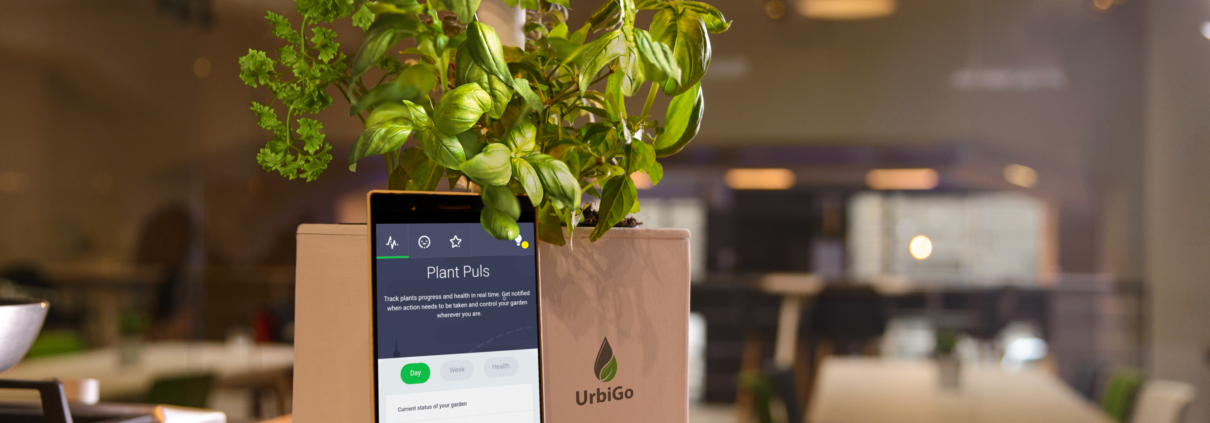Meet Urbigo: Your First Smart Home Garden from StartupYard Batch X
With each new batch of startups at StartupYard, we run a series of detailed interviews with the founders to give our community a sense of who they are, and how they see the world they’re trying to change. Last week we announced 7 new companies in StartupYard Batch X. Today, we jump in with an interview of Anja Varnicic, CEO and Co-founder of Urbigo, the urban smart garden company that promises to “Bring nature closer to you.”
Urbigo is a system including a small modular garden with grow lights, and cylinders for plants containing nutrients and water. The garden is controlled via an interactive mobile app, and users can get the latest advice on how to tend to their mini gardens, as well as order new plants, nutrients, and soil packs from Urbigo.
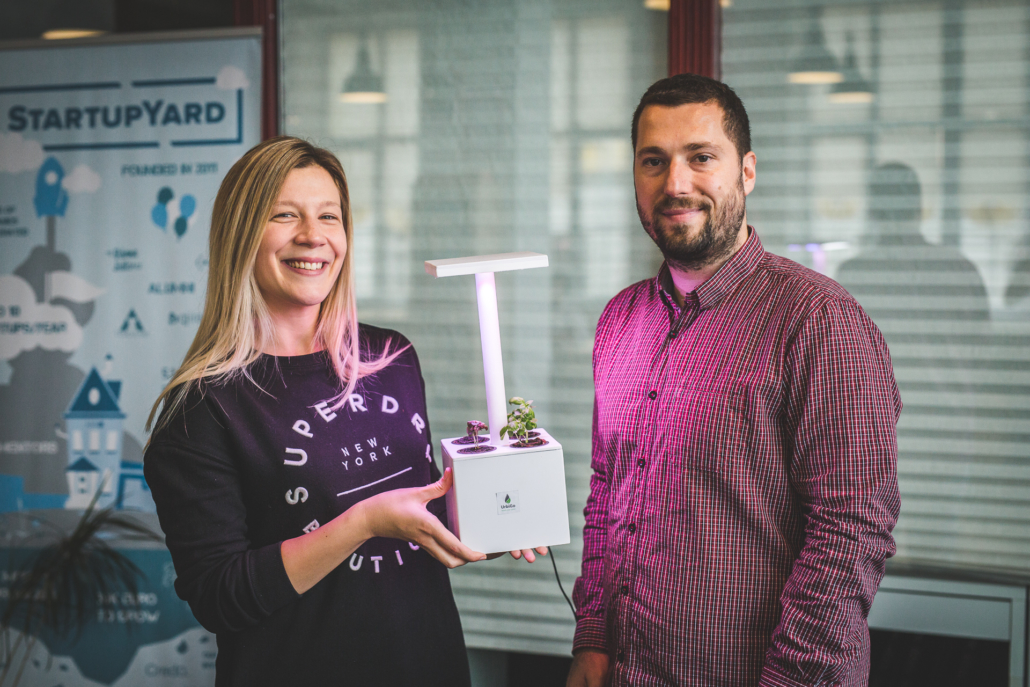
CEO Co-founder Anja Varnicic, shows off Urbigo’s Smart Garden with company CTO and Co-founder Aleksandar Varnicic

Hi Anja, coming from a plant biology background, what made you want to turn your passion for the science into a business, helping people grow plants at home?
So, as an environmental scientist, I have long asked the question: “what role do plants really play in our lives?” The truth is that we are entirely dependant on them. For oxygen. For nutrients. For flavor, and for our wellbeing. Yet modern society has moved off the farm, and now treats plants and spices as commodities that are easily fungible between one brand and another. If not from Spain, then from Brazil. If not from Turkey, then from California.
We don’t understand where our food and our air comes from anymore, and I think that is a problem for people living in cities. Of course, we can’t expect people all to live in hydroponic greenhouses in their flats, but we should get ourselves closer to the foods that we eat and the flavors that we taste.
The way of doing that for us at UrbiGo has been to bring just a little bit of green into people’s lives, and to show them the immediate benefits of tending to plants that we depend on for everything. We came up with a focus on spices that can be grown in the urban kitchen, because not only do fresh coriander or mint taste better than dried and packaged versions, but also getting something to eat directly from a plant in your home reminds you of the life behind the things that you eat, and the natural world you depend on.
As with any other true love story, the startup idea happened unexpectedly and accidentally. I wanted to make these ideas into a real business. Luckily enough, I had a chance to share my business idea with Alex, our now CTO, who had previous startup experiences. We shared our thoughts, he loved it, and boom – UrbiGo was born!
How do you think incorporating gardening into one’s everyday life can affect positive change for somebody living in a city?
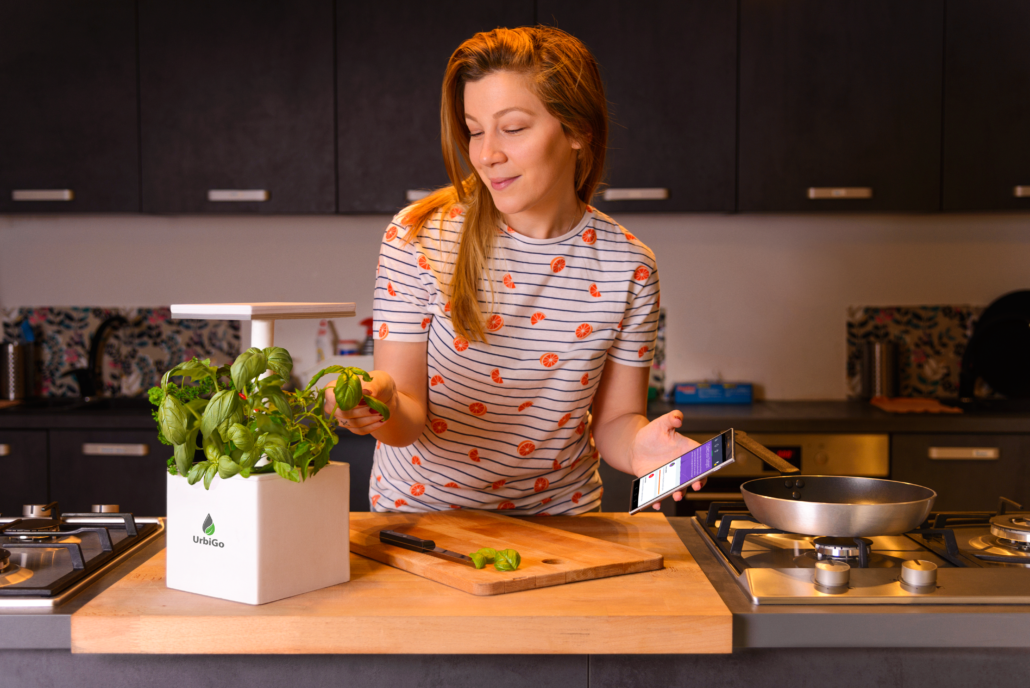
CEO Anja Varnicic is an environmental scientist and an engineer.
They say plants are the friends that always listen. And they really do. Indoor plants and urban gardening has become madly popular in the past few years because it reduces stress, make our air cleaner and our bodies healthier. And those are the thing we usually forget about or take for granted.
Having and growing fresh ingredients from your own garden is a creative activity. It brings us the same feelings we have as in making a sculpture or a painting, or writing a song. Gardening is viewed in Eastern cultures as almost poetic in nature.
For the millenial generation, we want to feel that connection to the Earth, and doing so makes us feel more responsible and more connected to nature. It makes us feel like grownups to be able to make life in an urban area where nature has seemingly little control.
I also believe that the millennial generation regrets the excessive commoditization of food. We yearn for the experience of knowing how our food is made, what it is, and how it makes its journey to our plates. So you see many different ways this is expressed in the modern consumer culture. Farm to kitchen restaurants. Farmer’s markets. Home gardens, and smart mini-gardens like Urbigo, that will help people to get back some of the control that we have lost over our diets and our environment.
]What would you say are the biggest mistakes we make when it comes to designing urban homes, and thinking about our living environment?
]Today, a larger share of younger urban residents live in rented flats or flatshares than have ever done in the past. What we see happening in cities is interior spaces being divided into smaller and smaller parts, and unless the presence of plants is part of the planning for those spaces, it ends up as a kind of afterthought.
Take a walk for example through an Ikea, which is where a lot of young people are going to get a sense of how to use their personal space… the plants are the last thing you see there. They are the afterthought. They are what you add when you have everything done.
This is backwards, I think. We need to plan more around plants, and plan to live with more plants in our personal spaces. That can affect the placement of windows, or the whole design of a building. The use of light must be reconsidered. In some cities such as Paris or Berlin now, whole buildings are being constructed with plants on their walls and rooftops. This is a good start.
Do not treat plants as a pleasant addition to your home. If you do, you will not have room for them when you decide they are the thing missing for you.
Let’s talk more about Urbigo’s products. What would you say distinguishes you from other indoor gardening solutions? What is your “killer app?”
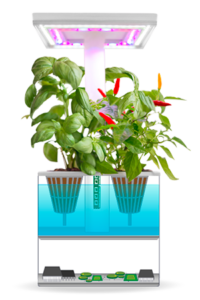
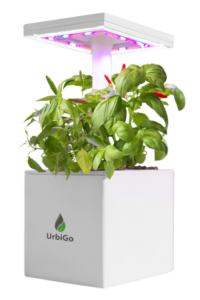
UrbiGo isn’t just a fancy smart garden that grows fresh herbs for you – it is a community of plant lovers and enthusiasts that are changing urban gardening as we know it.
UrbiGo gardeners get to control their UrbiGo mini smart garden from their phones and learn how to grow their own fresh and nutritious ingredients in a fun and simple way through a gamified app. By completing daily challenges in the app we want to motivate and empower people to become successful urban gardeners and live more sustainably.
We take some cues from products such as FitBit, or Calm, an App for managing stress and relaxation. The way they engage millions of users into doing something good for their body and mind is something we can learn from. Tending to your garden should be a small but integral part of your daily ritual, and with UrbiGo app we want to make the process learning and enjoyable even for those who could kill a cactus.
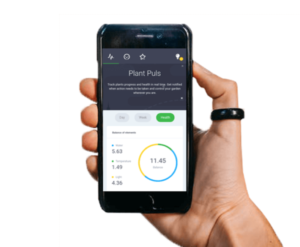
The Urbigo App
Now is an interesting time for home gardening, because today urban millennials are becoming used to healthy lifestyle daily rituals using technologies like smartphones and watches. We don’t want to suck people into paying attention to their phones, but rather to use the medium of the smartphone to help people live a healthier and more satisfying life, and live in a better environment.
Suppose that urban gardening becomes the norm for people living in cities 10 or 20 years from now. How else would you like to change the way we design our lives around food, cooking, and living spaces in the future?
Since we tend to spend most of our days in offices and indoor spaces, I believe it will be essential to stay connected with things that matter most like family, friends and nature. Plants and greenery have this power to gather people, especially in urban areas where those are scarce. And we wanted to make this values approachable and simple for our users which inspired us to create product and a network of like minded plant lovers and untaped enthusiasts.
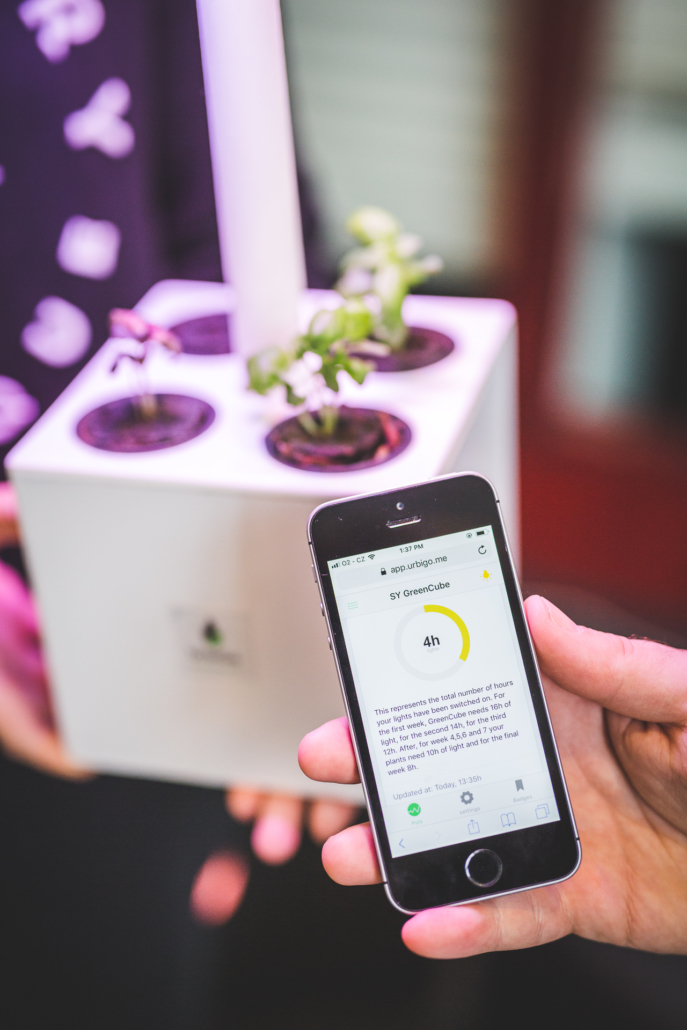
Many people living in cities rarely if ever buy fresh spices and ingredients for cooking. What are they missing out on? What are some of the concrete benefits of growing at home?Besides improving your overall health, growing and consuming your own fresh ingredients makes you connected with nature and origin of your food, that obviously doesn’t grow on market shelves and from plastic packaging.
We’ve heard lots of complaints from our customers, that store-bought herbs dry out in a matter of a few days and don’t have the fresh and intense tastes they’ve come to expect. Once you have something fresh, it can be very striking to taste the difference between that, and something not fresh. So I think people should have more choice about what to consume and when to consume it – this is why the UrbiGo app educates consumers about the benefits of “growing your own ingredients” so you can make proper decisions about your health and wellbeing. Be better informed, and make more informed decisions.
Food gardening is most of all a local and sustainable way of producing fresh ingredients and educating your family on where your food comes from. As cities transform into concrete jungles, this kind of relationship with nature will become crucial for us future generations’ well-being.
As a business, where would you like Urbigo to be 5 years from now? What will be your metric for having accomplished your mission?
We go where our customers needs are, and thus we are experimenting with the ways to include smart indoor gardening into every future home. The next logical long term step would be to incorporate UrbiGo into the smart home device network because there is a space and interest in companies for the next gen “plant device” that would improve urban health and connect with their low-friction lifestyles.
For now our goal is to get a smart garden into every home, and turn that into a network of people who are thinking much more about their well-being, health and importance of food gardening.
Imagine, using smart home technology to, in a way, bring us back to an earlier age when you would ask your neighbors for an egg or a cup of sugar. Maybe in 5 years you will be able to use UrbiGo to compete in urban gardening skills with your neighbor, grow chillies in your office desk or have a “green pet” for your kids. Maybe it will lead to people sharing much more of their domestic lives and spaces with each other, and helping each other to live better.
I think these very locally focused changes will be a very important part of the smart-home of the future. Not that you are one home connected to the whole planet, but that you are one home connected to the homes around you as well. We all share one environment, and the best way to improve it is to connect and learn together.
You’re employing a number of new technologies in Urbigo’s gardens already, like 3d printing, and LED lighting. How do you see technology making urban gardening even easier in the future?
New technologies have allowed urban gardening become more “smart” and resilient to climate change effects we are experiencing. So you don’t have to be dependent 100% on sunlight, ever changing weather conditions or your personal skills and knowledge .
But, still, people don’t want technology to do everything for them, because growing and tending plants can be part of a soothing ritual as well. I see technology as a tool to make your everyday life greener, easier but also to empower you to learn and share your urban gardening experience with others. We cannot stop urbanization, but with technology we can help people stay connected with nature.
Has there been a major surprise for you since joining the StartupYard program? Did you learn something you weren’t expecting to?
I’m not sure if it was a surprise, but we have certainly noted that the interest in smart gardening in the corporate and business spheres are also growing very fast. I think as millennials begin to move higher in large organizations, this is going to become an area where we can have a big impact with our product.
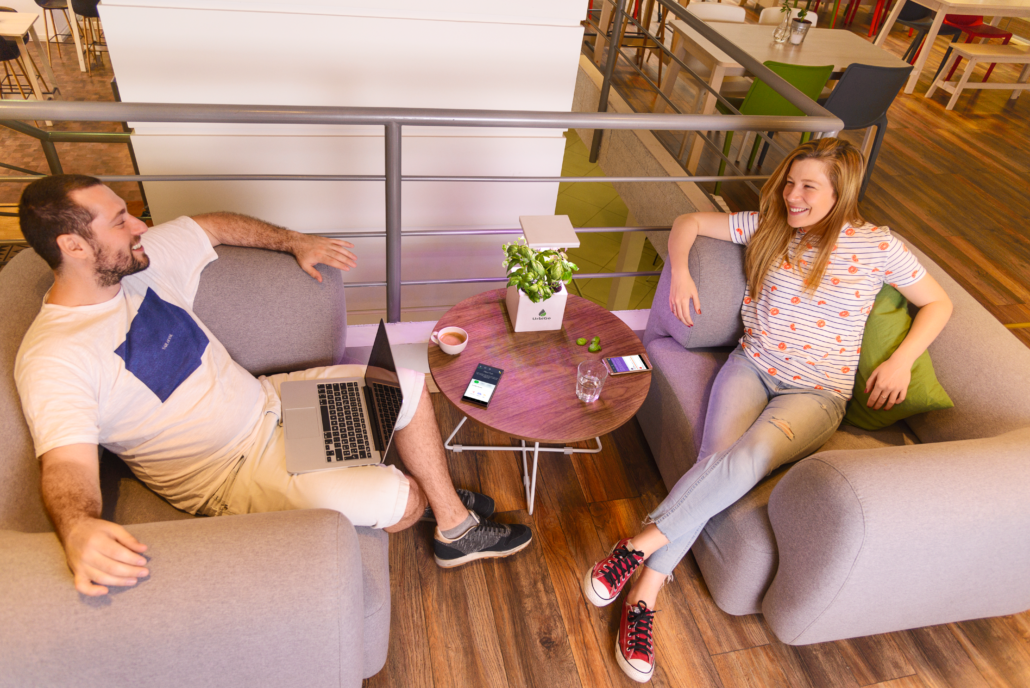
The Urbigo Founders brought some life into StartupYard this round
People spend up to half their time in offices, and in many cases, these spaces are poorly adapted to keeping people healthy and happy. Companies are understanding more and more that the total wellbeing of their employees is a vital consideration, and that if they cannot provide a better environment for people, then workers will go to those who can. I think this is very positive, and I hope to continue to raise people’s standards for their immediate environment, and inspire people to demand greener workplaces.
What have been your team’s biggest personal or professional challenges in making this project a reality?
We’ve been able to grow the waitlist for UrbiGo to over 500 people and we got major interest not just from individuals but also corporates. One of the challenges for us, as we are engineers, was to let go of some of our ideas about what people should like, and really listen to what our customers are saying about what they want.
You can come up with great ideas, but if you can’t get your ego out of the way, you will miss the experiences and stories that really define who your customers are, and how they see your products fitting into their lives. Learning this at the beginning of our startup journey was crucial to get first sales, traction and investments.
We cannot stop the technology and urbanization, but we have to design a product that accommodates our customer’s fast paced life and needs and also engages them into doing something little everyday that is good for themselves. This is an ongoing process but we are happy that so many people help us do that and share our vision.
What do people need to get started with their own urban gardens? How can they get their hands on an UrbiGo smart garden?
Since UrbiGo does not require big space, plant knowledge or time but accommodates to your lifestyle, you are basically one click away from starting to grow your mini indoor garden.
We have had testers out in the field for a whole, and we’re ready to go live. Right now, we are taking signups for a special, limited first batch of Urbigo gardens for those real enthusiasts who are ready to join our smart urban gardening community. This exclusive run will start delivery in December 2018, and the wider public will be able to order from Urbigo during the next year.


